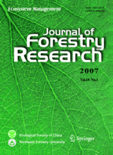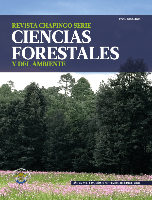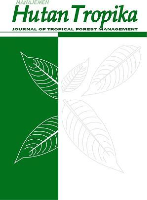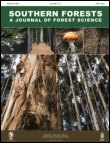
Forest Ecosystems
Scope & Guideline
Empowering voices in the realm of forest science.
Introduction
Aims and Scopes
- Forest Ecology and Biodiversity:
Research on the diversity of tree species, plant communities, and the ecological interactions that sustain forest ecosystems. This includes studies on species assemblages, functional diversity, and the effects of disturbances on biodiversity. - Forest Management and Sustainability:
Investigations into sustainable forest management practices, including the impacts of harvesting, restoration techniques, and management strategies on forest health and productivity. - Carbon Dynamics and Climate Change:
Studies focusing on carbon sequestration, soil carbon dynamics, and the effects of climate change on forest ecosystems. This area includes research on the role of forests in mitigating climate change and assessing their resilience. - Forest Restoration and Rehabilitation:
Research aimed at understanding the processes and outcomes of forest restoration efforts, including the ecological impacts of reforestation and afforestation initiatives. - Remote Sensing and Modeling:
Utilization of remote sensing technologies and modeling frameworks to assess forest structure, biomass, and health, as well as to predict responses to environmental changes. - Soil-Plant Interactions:
Exploration of the relationships between soil properties and plant growth, including nutrient cycling, soil microbial dynamics, and the effects of different land-use practices.
Trending and Emerging
- Machine Learning and Data Analytics:
There is an increasing trend in the application of machine learning techniques for analyzing forest data, improving predictions of forest dynamics, and enhancing the accuracy of forest inventory assessments. - Ecosystem Services and Multifunctionality:
Research focusing on the multifunctionality of forest ecosystems, including their roles in biodiversity conservation, carbon storage, and provision of ecosystem services, is gaining momentum as more studies assess the broader impacts of forest management. - Climate Change Adaptation Strategies:
A growing body of work is emerging around strategies for forest adaptation to climate change, including resilience assessments and the exploration of species' responses to shifting environmental conditions. - Soil Carbon Sequestration Research:
An increasing emphasis on understanding soil carbon dynamics and the factors influencing carbon sequestration within forest ecosystems reflects the urgent need to address climate change and its impacts on soil health. - Functional Trait Diversity:
Emerging studies are increasingly focusing on the functional traits of trees and their implications for ecosystem processes, highlighting the importance of species interactions and community dynamics in forest ecosystems.
Declining or Waning
- Invasive Species Impact Studies:
Research related to the effects of invasive species on forest ecosystems has seen a decline. This may indicate that previous findings have been sufficiently addressed, or that researchers are now focusing on other pressing issues in forest ecology. - Traditional Forest Inventory Techniques:
There is a noticeable reduction in studies utilizing conventional forest inventory methods, as newer technologies and approaches, such as remote sensing and machine learning, gain traction and demonstrate superior efficiency. - Historical Analysis of Forest Changes:
Although historical analyses remain important, there has been a shift away from purely historical studies towards more contemporary and predictive approaches, reflecting a need for immediate solutions in forest management. - Single Species Focus:
Research focusing exclusively on single tree species is becoming less common, as there is a greater emphasis on multi-species interactions and ecosystem-level studies that consider the complexity of forest dynamics.
Similar Journals

FOREST SCIENCE
Bridging theory and practice for sustainable forests.FOREST SCIENCE, published by Oxford University Press Inc, is a pivotal journal in the field of forestry and ecological modeling, boasting an impressive track record since its inception in 1970. With an ISSN of 0015-749X and E-ISSN 1938-3738, the journal provides a valuable platform for the dissemination of high-quality research and studies that address contemporary challenges in forestry and ecology. It ranks in the Q2 category for both ecology and forestry and holds a Q3 ranking in ecological modeling according to the latest evaluations, illustrating its significant contribution to these fields. The journal is accessible through various options, facilitating broad readership and engagement within the academic community. As part of its commitment to advancing knowledge and practices in forest management and conservation, FOREST SCIENCE seeks to bridge theoretical research with practical applications, making it an indispensable resource for researchers, professionals, and students alike.

JOURNAL OF FORESTRY RESEARCH
Fostering knowledge to nurture our forests.JOURNAL OF FORESTRY RESEARCH, published by Northeast Forestry University in China, stands as a pivotal platform for advancing the field of forestry science. With an ISSN of 1007-662X and an E-ISSN of 1993-0607, this esteemed journal has maintained its commitment to disseminating high-quality research since its inception in 1997, converging into a recognized authority through the years. Currently boasting a Q1 ranking in the Forestry category for 2023, it ranks 18th out of 174 journals in its field on Scopus, highlighting its vital role in shaping contemporary forestry studies. The journal focuses on a broad spectrum of topics pertinent to forestry, including sustainable forest management, ecology, and conservation efforts, making it an indispensable resource for researchers, professionals, and students alike. Although it is not an open-access publication, the insights shared within its pages promise to contribute significantly to the advancement of knowledge and practices in forestry. The journal's significant impact and relevance are underscored by its operations from Harbin, People's Republic of China, where it continues to foster scholarly communication in the world of forestry research.

CANADIAN JOURNAL OF FOREST RESEARCH
Transforming challenges into opportunities in forest research.Canadian Journal of Forest Research (ISSN: 0045-5067, E-ISSN: 1208-6037), published by Canadian Science Publishing, stands as a leading platform for disseminating cutting-edge research in the field of forestry and ecological sciences. With an impressive impact factor and a steady reputation for high-quality publications, this journal occupies a prestigious position indicated by its Q1 ranking in Forestry and Q2 in Ecology as of 2023, alongside commendable placements in global and planetary change studies. Covering a broad scope from sustainable forest management to the impacts of climate change on forest ecosystems, the journal encourages submissions that address contemporary challenges and innovations in forest research. Operating from its base in Ottawa, Canada, the Canadian Journal of Forest Research has been a cornerstone of academic discourse since 1974, offering researchers and professionals vital access to pioneering studies that inform policy and practice in forestry. Researchers, educators, and students alike will find this journal an indispensable resource for advancing knowledge and fostering collaboration in the vital realm of forest research.

BALTIC FORESTRY
Transforming Forestry Through Cutting-Edge ResearchBALTIC FORESTRY, published by the INST FORESTRY LRCAF in Lithuania, is a prominent academic journal that serves as a platform for disseminating cutting-edge research in the field of forestry. With an ISSN of 1392-1355, this journal is dedicated to advancing knowledge on sustainable forest management, ecological impacts, and resource conservation, among other vital topics. As of 2023, it has been categorized in the Q3 quartile for forestry in Scopus, indicating its solid reputation among peer-reviewed publications, ranking #95 out of 174 in the realm of Agricultural and Biological Sciences. BALTIC FORESTRY features contributions from researchers across the globe and encourages innovative approaches to solving contemporary challenges in forestry, making it an essential resource for professionals, scholars, and students alike. Although it operates under subscription-based access options, the journal's commitment to fostering academic discourse is unwavering, aiming to bridge the gap between theory and practice in forest science.

Revista Cubana de Ciencias Forestales
Connecting research and practice in forest sciences.Revista Cubana de Ciencias Forestales, published by UNIV PINAR RIO HERMANOS SAIZ MONTES OCA, is a vital resource in the field of forestry and environmental sciences. Since its inception in 2013, this Open Access journal has dedicated itself to disseminating high-quality research and innovations pertinent to forest ecology, sustainable management, and conservation strategies within the Cuban context and beyond. The journal aims to foster academic dialogue among researchers, professionals, and students by providing a platform for the sharing of interdisciplinary studies that address contemporary challenges in forestry. With its commitment to accessibility, Revista Cubana de Ciencias Forestales ensures that knowledge is available to a global audience, thereby contributing to the advancement of forest sciences and ecological awareness.

Revista Chapingo Serie Ciencias Forestales y del Ambiente
Advancing knowledge in Ecology and Forestry.Revista Chapingo Serie Ciencias Forestales y del Ambiente, published by Universidad Autónoma Chapingo, serves as a prominent platform for scholars and practitioners in the fields of Ecology and Forestry. Established in 2001, this open access journal has made significant strides in disseminating research that addresses pressing environmental issues, particularly within the Mexican context. With an ISSN of 2007-3828 and E-ISSN of 2007-4018, it has been recognized for its contributions, earning a Q3 ranking in both Ecology and Forestry categories as of 2023. The journal is pivotal in fostering collaboration and knowledge exchange among researchers, professionals, and students dedicated to understanding and preserving forest ecosystems. Access to its rich content is unrestricted, enhancing visibility and impact for innovative research and practical applications in sustainable management and conservation practices.

Jurnal Manajemen Hutan Tropika
Unlocking insights for sustainable forestry solutions.Jurnal Manajemen Hutan Tropika, with ISSN 2087-0469 and E-ISSN 2089-2063, is an esteemed academic journal published by the Bogor Agricultural University, Faculty of Forestry in Indonesia. Since its inception in 1999 as an Open Access journal, it has been dedicated to advancing knowledge in the fields of ecology, forestry, and related environmental sciences. Aiming to provide a robust platform for disseminating research, it has achieved notable rankings within Scopus, including a Q3 classification in Ecology and Ecology Evolution, as well as a Q2 ranking in Forestry for 2023. The journal's commitment to open access ensures that vital research findings are readily available to researchers, professionals, and students alike, fostering collaboration and innovation in tropical forest management. Located at KAMPUS IPB DARMAGA, BOGOR, JAWA BARAT, this journal continues to be a significant resource for enhancing sustainable forest practices and contributing to ecological understanding in the region and beyond.

Journal of Forest Research
Exploring the intricate relationship between society and forests.Welcome to the Journal of Forest Research, a pioneering publication dedicated to advancing the field of forestry and sustainable ecosystem management. Published by Taylor & Francis Ltd and boasting an impressive Q2 ranking within its category, this journal highlights significant research contributions and innovative practices in forest science. With an ISSN of 1341-6979 and E-ISSN of 1610-7403, the journal spans a fruitful history from 1996 and continues to be an influential platform up to 2024. The Scopus rank places it at an esteemed #55 out of 174 in the realm of Agricultural and Biological Sciences, reflecting its high impact within the community. While this journal is not open access, it offers targeted content for researchers, professionals, and students seeking to deepen their understanding of forest ecosystems and promote sustainable practices. Join us in exploring the intricate relationship between society and forests, and contribute to a crucial dialogue on environmental stewardship.

Forests
Championing open access to vital forestry knowledge.Forests is a premier open-access journal published by MDPI, dedicated to advancing research in the field of forestry and its related disciplines. Established in 2010, the journal has rapidly gained recognition, achieving a distinguished Q1 ranking in Forestry and holding a commendable position of 38 out of 174 in the Agricultural and Biological Sciences category within Scopus, placing it in the 78th percentile. With a mission to disseminate high-quality research, Forests serves as a vital platform for the exchange of innovative findings, methodologies, and applications related to forest ecosystems, management, conservation, and the socio-economic aspects of forestry practices. As an open-access publication based in Switzerland, it ensures that research is readily accessible to a global audience, fostering collaboration and knowledge sharing among researchers, professionals, and students alike. The journal is committed to contributing to the sustainable management of forest resources and enhancing the understanding of complex forest environments through interdisciplinary approaches.

Southern Forests-A Journal of Forest Science
Illuminating Pathways in Forest Research and ConservationSouthern Forests: A Journal of Forest Science, published by Taylor & Francis Ltd, serves as a vital platform for scholarly discourse in the field of forestry. With a robust ISSN of 2070-2620 and E-ISSN of 2070-2639, this journal highlights cutting-edge research and vital advancements from 2008 to 2024. Based in the United Kingdom, it continues to make significant contributions, evidenced by its current Q3 ranking in the forestry category of Scopus as well as its rank of 94 out of 174 in Agricultural and Biological Sciences. This journal caters to a diverse audience of researchers, professionals, and students, providing access to high-quality articles that promote sustainable forest management and ecological studies. Despite being classified as a non-open access journal, it remains a key resource, ensuring accessibility to crucial information that addresses both local and global forest challenges.